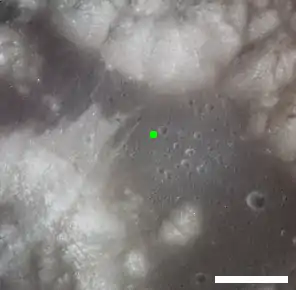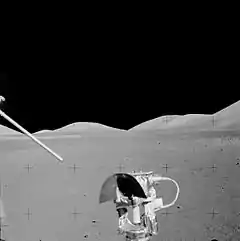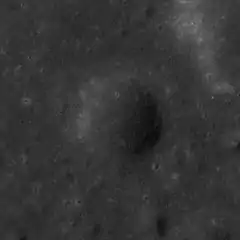 Location of Horatio crater in Taurus-Littrow Valley. South Massif is at lower left, North Massif is at top center, and Sculptured Hills are at upper right. Scale bar is 5 km | |
| Coordinates | 20°11′N 30°43′E / 20.19°N 30.71°E |
|---|---|
| Diameter | 380 m[1] |
| Eponym | Astronaut-named feature |
Horatio is a feature on Earth's Moon, a crater in Taurus-Littrow valley. Astronauts Eugene Cernan and Harrison Schmitt drove the Lunar Roving Vehicle along its south rim in 1972, on the Apollo 17 mission, but did not stop.
The larger Camelot crater is to the northeast. Geology Station 5 is along the south rim of Camelot. Victory is to the northwest, and Brontë is to the southwest.
The crater was named by the astronauts after the fictional Horatio Hornblower from the works of C. S. Forester.[2]

Photo taken from the rover while driving west from the landing site towards the South Massif, and part of Horatio is probably shown on the right[3]

Apollo 17 panoramic camera image
References
- ↑ Horatio, Gazetteer of Planetary Nomenclature, International Astronomical Union (IAU) Working Group for Planetary System Nomenclature (WGPSN)
- ↑ The Valley of Taurus-Littrow, Apollo 17 Lunar Surface Journal, Corrected Transcript and Commentary Copyright 1995 by Eric M. Jones
- ↑ Apollo 17 Image Library, Magazine 135/G
External links
- 43D1S2(25) Apollo 17 Traverses at Lunar and Planetary Institute
- Geological Investigation of the Taurus-Littrow Valley: Apollo 17 Landing Site
This article is issued from Wikipedia. The text is licensed under Creative Commons - Attribution - Sharealike. Additional terms may apply for the media files.